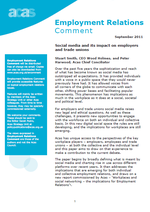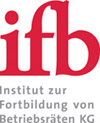 |
|
Welcome to issue no. 3 / 2011 of EWC News. 24th October 2011
|
|
The
training and consultancy network
"euro-workscouncil.net"
EWC
News appears four times a year.
You can find past issues in the newsletter archives.
|
|
1.
First legal proceedings under new EWC legislation
|
|
The new German EWC legislation is already having its acid test in court just a few weeks after it came into force, on 18th June 2011 (see report in EWC News 2/2011). On 8th September 2011, the State Labor Court of Cologne ruled in second instance against an injunction order and refused the European works council of Visteon, the US automobile supplier, its legal participation rights in the context of a planned plant closure in Spain. On the one hand the court concluded that the rights of the EWC had been denied. On the other, the court could not see a way of enforcing the provisions of the new EWC Directive within the German legal system. All following links are available only in German: Background information on the court case
Visteon’s central management communicated its plans for the closure of a plant in Spain on 23rd June 2011. The European works council subsequently started the consultation procedure, in an extraordinary meeting held on 12th July 2011, by appointing experts from the training and consultancy network "euro-workscouncil.net" to examine the business data and by introducing legal proceedings (see report in EWC News 2/2011). Although the consultation procedure, including an examination of possible alternatives to the closure, had not yet started, central management wanted to create a fait accompli. To preserve its rights, the EWC had no other choice but to start legal proceedings to stop unilateral action by central management. This corresponds to the basic philosophy of the new EWC Directive and was already successfully put into practice in France under the old legislation (see report in EWC News 1/2008).
Does
the German EWC legislation at all comply with the Directive?
Visteon’s central management made it clear in the EWC meeting held from 28th to 30th September 2011 in Berlin: the decision for the plant closure had already been taken before the EWC was informed. In the opinion of the employer, the legal provisions for a consultation procedure should exceptionally be dropped in this one case, purposefully violating thereby the new EWC legislation. The opinion of the EWC chairman: Thomas Rösner
In the plenary meeting held on 30th September 2011 in Berlin and in the presence of the Spanish representatives, the EWC of Visteon decided to use all possible legal means including as far as the European Court of Justice in Luxembourg if necessary. We take the new EWC Directive very seriously.
The current legal case is unique from two aspects:
1.
Since the EWC Directive was adopted in 1994 there have been no
comparable legal proceedings in Germany which have ended with a
decision. The only known case is that of Forbo, a chemical company,
which ended up in 2004 before the Labor Court of Lower Saxony with no
ruling (see background
report).
2. It is the first legal dispute in the whole of Europe since the new EWC laws have come into force. Should the lawsuit actually come before the European Court of Justice, it would have an effect on all European Union countries – including those who handle participation rights for works councils in a much more restrictive manner e.g. the United Kingdom. Indirect effects would also result for SE works councils.
Legal grey area with financial risks for employers
An irregularity in the consultation procedure can turn out expensive. This was the experience of the Finnish company, Fujitsu Siemens Computers, when it had to make supplementary redundancy payments of 3 million Euros to employees, due to a consultation procedure that had not been carried out correctly. In September 2009 the European Court of Justice used the case as an opportunity to define more clearly the formal flow of a consultation procedure (see report in EWC News 3/2009).
The opinion of the expert in employment law: Professor Däubler
The Cologne ruling can be contested. The court did not take into consideration what information and consultation really mean under the new legislation. In the opinion of most labor courts the employer may not create any fait accompli during negotiations on the reconciliation of interests; otherwise he can be forbidden from doing so by injunction. The same should apply to the European works council – such as in France and Belgium. They have obviously forgotten to set the clock forward in Cologne. European works council action day  Conference focusing on the court case During the next EWC conference on 23rd January 2012 in Hamburg, the training and consultancy network "euro-workscouncil.net" will examine the legal consequences of this court case for all European works councils. Speakers will include the EWC chairman Thomas Rösner as well as Professor Däubler. |
|
2.
Practical tip: Correct flow for consultation procedure
|
|
The "blueprint" for the EWC Directive originates from France
In view of the new legal situation many work council members are confronted with the question of how they can put into practice the new standards of information and consultation. French dominated European works councils have more success in the matter. Why?
When the EWC Directive emerged in 1994, the European Commission based itself on practical examples already in existence. At that time there were transnational forums with employee representatives in 49 companies which were to a large extent French. The Directive is therefore strongly marked by the French model. The word "codetermination" is to be seen nowhere. German employment lawyers, German works councils and German managers are ill at ease with this. In order to understand the correct flow of a consultation procedure, it is therefore worthwhile having a look at French labour legislation.
The rules for Information and Consultation put to the test for many years
Over
and over again, the
implementation of unilateral measures have been stopped by the
employment tribunals and workforce reductions can only made after long
delays (see report in
EWC News 4/2009). An incorrectly completed
consultation procedure has a similar legal effect in France to a formal
irregularity of the employer for individual dismissals in Germany. The
measure is then invalid. The European works council is no longer a song-and-dance act
For the first time, the European legislator has defined the information and consultation procedure for the EWC in this French spirit. Now it is a matter of transposing it into practice and further developing the EWC into a negotiating partner of central management. There exist already examples (see report in EWC News 1/2011).
Seminar on the implementation of consultation procedures
Once again a seminar will be held in Montabaur castle from 10th to 13th April 2012, for European works council members wishing to optimize their consultation procedures on restructuring on the basis of the new EWC Directive – according therefore to the French model. The seminar is to be held in co-operation with a French consultancy firm for works councils and is also suitable for SE works council members.
|
|
3. Downsizing on the international agenda
|
|
After three years Nokia moves on
The relocation to Romania in 2008 was given wide media coverage in Germany. In the new factory in the beginning there were no employee representatives and even legal proceedings were introduced for the recognition of trade unions (see report in EWC News 3/2010). The group has now offered three months pay as compensation, and negotiations have been in progress since the beginning of October 2011 with the two trade unions represented in the plant.
On 12th October 2011 ArcelorMittal announced the closure of two steel plants near Liège. These are the last blast furnaces in operation in Wallonia, a region dominated in former times by heavy industry. The European works council held an extraordinary meeting on 18th October 2011. This unilateral decision is incomprehensible for the employee representatives, since Lakshmi Mittal, the Indian billionaire who took over Arcelor in 2006, had committed to the existing social dialogue. As recently as November 2009 central management had accepted a comprehensive consultation model for restructuring as part of a European-wide framework agreement (see report in EWC News 4/2009).
The current trend in the world’s largest steel group is to attach an ever smaller significance to social dialogue. Since spring 2010 already there are no longer any employee representatives on the group’s administrative board, which is located officially in Luxembourg, but is in fact managed from London. The Indian billionaire Mittal holds personally the chair of the European works council since July 2007 according to the French model (see report in EWC News 2/2007).
British train manufacturers take their protest to the House of Commons
|
|
4. New EWC legislation
|
|
As one of the last of 30 countries within the European Economic Area (see report in EWC News 2/2011) the Council of Ministers adopted new legislation on the European works council on 19th October 2011 in Paris. In January 2011, the national assembly had authorized the government to make changes to the existing EWC legislation by decree. Despite this simpler procedure the delay comes as a surprise, since in December 2008 the French government was actively pushing on the EU-level for a rapid adoption of the new Directive (see report in EWC News 4/2008).
The transposition in the French labour code follows literally the provisions of the EU, with one single exception: there is a provision for EWC consultation in hostile takeovers which does not exist in other countries (see report in EWC News 2/2011). However the key element of the French EWC legislation does not lie in its wording, but in its practical application. In no other European Union country do employment tribunals intervene in infringement of works council rights as strongly as they do in France, the motherland of the consultation model. Following texts are available only in French:
German-Belgian Works Council conference in Brussels 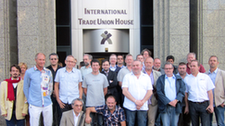 
Around
25 employee
representatives met on 29th and 30th September 2011 in the
International Trade Union House in Brussels. Participants included
German representatives whose EWC operates under Belgian legislation,
whereas some Belgian participants came also from companies with their
EWC under German law. On the first day, therefore, the focus was on an
exchange of experience on the characteristics of both systems of
industrial relations. Hard sanctions against violation of EWC rights   During
the conference, Marie-Noël Dinant from the Belgian Ministry
of Labour and the Belgian labour lawyer Prof. Dr Filip Dorssemont
(photo) reported on the details of the transposition, which was
implemented by a universally binding collective agreement. The
possibility is open to European works councils under Belgian
legislation to impose, through injunction procedures, enormous fines on
central management when the consultation procedure is not respected.
The Belgian labour legislation is therefore aligned with the extensive
regulations in France. During
the conference, Marie-Noël Dinant from the Belgian Ministry
of Labour and the Belgian labour lawyer Prof. Dr Filip Dorssemont
(photo) reported on the details of the transposition, which was
implemented by a universally binding collective agreement. The
possibility is open to European works councils under Belgian
legislation to impose, through injunction procedures, enormous fines on
central management when the consultation procedure is not respected.
The Belgian labour legislation is therefore aligned with the extensive
regulations in France.
English translations of EWC legislation available The
European Commission has had the texts of all currently available EWC
legislations, translated into English. They are available for
downloading. Furthermore, on 30th August 2011, it published a review
showing how the EWC Directive was transposed in the individual
countries. According to this, the following countries have not yet
updated their EWC legislation: Greece, Luxembourg, the
Netherlands, Poland, Romania and Iceland. In Italy there is only an
agreement between the social partners, but still no new legislation.
|
|
5. Renewal of EWC
agreements
|
|
German machine manufacturer surpasses new EWC standards
In the EWC there are 35 representatives from 23 countries, including Switzerland and Croatia. If seats remain vacant, the executive committee can take the initiative to organize elections in the individual countries. It has been extended to seven members. Separate divisional meetings take place for the different product ranges in addition to the annual plenary session.
The definitions for information and consultation were more precisely clarified than in the EWC law. Consequently information is to be supplied "as fast as possible and in a timely manner", without the EWC having to make their own investigations and as soon as management starts to think about possible measures. The transnational competence was also formulated more clearly than in the law, to cover, under certain circumstances, even events outside Europe. While a consultation procedure is in progress, EWC members may meet and discuss at any time with local work councils on-site.
Largest British pharmaceutical group sets standard
The
employer still holds chair
and the secretary is also nominated by the employer after consultation
with the employees’ side. The frequency of EWC plenary
meetings for the 33 members from 19 countries remains unchanged at one
per year. There is however an increase in the number of steering
committee meetings. In the future it will be composed of six employee
representatives from six countries, and will meet six times per year,
including four times with central management. Any extraordinary
meetings are not included in the count. The definition of information and consultation corresponds to the new legal situation; however the delay for rendering an opinion has been limited to ten days. The procedure takes place before the final decision of central management on the implementation of a measure. The steering committee will even be informed, should only one single country be concerned. The agreement plans time-off for all EWC members, so that they can inform employees from their own country and collect their opinion. This is particularly important for countries where there are no works councils.
Austrian building materials’ manufacturer renews old agreement
In the future each EWC member has an individual training quota of five days per year, with in particular, provisions for language courses. The steering committee has been increased to five members, from at least three different countries. It meets twice a year, which does not yet meet with the new Directive’s standards, but it has however a right of access to all business locations. The plenary is held once annually. One positive feature are the workshops held between EWC members and regional management in the individual European geographical regions.
Information (but not consultation) has been defined in the same spirit as the new legislation and provisions made for an own right to experts, in addition to trade union advisors. One particularly noteworthy feature: after notice is given for termination of the EWC agreement there will be no period where the works council does not exist. This is normally the threat with old agreements signed for the first time before 22nd September 1996.
The texts of EWC agreements are available for download on a special website.
|
|
6. Works
councils develop transnational solutions
|
|
Lafarge, the French building materials’ group, has reinforced the importance of occupational health and safety in co-operation with its European works council. A bi-lateral declaration was signed on 1st June 2011 in Paris which not only lays down fundamental principles, but also delegates tasks to the EWC.
In the future in each EWC steering committee meeting, central management will present data from all countries on accidents at work. The EWC’s health-working group meets two or three times per year to discuss current health concerns. Every employee in Europe can lodge a complaint with the EWC, should no remedial action be taken in the country beforehand. A similar charter was signed in June 2010 for Etex, the Belgian building materials’ group (see report in EWC News 2/2010).
French insurance group
regulates long-term personnel planning
The new framework agreement outlines the creation of a European-level observatory for occupational skills. This will identify professions which are on the rise or on the decline or which have been newly created. As a result concrete measures are to be developed so that the employability of Axa employees can be improved. Redundancies and social plans are to be implemented only as a last resort, once all other measures from the agreement have been exhausted.
A globally applicable agreement on health, safety, working conditions and stress was signed for Danone, the French food producer on 29th September 2011 in Paris. It designates trade unions as the social-dialogue partners and grants the right for individual employees to leave the workplace in the case of health risks. There are in addition provisions for regular medical surveillance. Nobody is to be discriminated against because of health problems. In June 2007 Danone had already concluded an international anti-discrimination agreement (see report in EWC News 4/2007) and since October 2009, the EWC has met regularly with employee representatives from other parts of the world (see report in EWC News 4/2009). |
|
7.
Italy: Reform of collective bargaining system
|
|
While the government is still battling with the consequences of the economic and financial crisis and its own scandals, Italian social partners have taken an important step towards enhancing co-operation and legal certainty at the company level. An "interconfederal agreement" was signed on 21st September 2011 in Rome between the three large trade union confederations CGIL, CISL, UIL and the employers’ confederation, Confindustria, opening a new chapter in Italian industrial relations.
Such agreements of the umbrella organizations have considerable practical significance in Italy, similar to the Collective Bargaining Act or the Works Constitution Act in Germany. The following new rules were already laid down in a draft from 28th June 2011:
The agreement sets down clear rules for the recognition ("representativity") of trade unions. A trade union is considered representative, when it is able to organize more than 5% of all employees within a particular industrial sector throughout Italy. The measurement of representativity is determined in a two-stage process by public institutions and acknowledged in an official document. Only representative unions may put forward candidates for elections to the workplace representation body RSU. Since company agreements are negotiated by the RSU, non-representative unions are therefore automatically excluded from collective bargaining policy. There are no German-style works council agreements due to the lack of co-determination. Therefore all in-house questions have to be regulated within the framework of free collective bargaining.
In crisis situations the RSU can agree on special in-house arrangements with the employer and deviate from sectoral collective agreements. Such agreements require however approval from the next level of trade union authority.
The agreement regulates the binding force of in-house collective agreements. In the future any in-house collective agreements concluded by the RSU are also legally binding for those minority trade unions who have spoken out against them. They can only prevent the entry into force by requesting a ballot within ten days, and in which more than half of the workforce rejects the collective agreement. Just as in German works council agreements, any in-house agreements concluded by the RSU apply to all employees of the company.
A no-strike clause is not feasible in practice. If the contracting parties submit voluntarily to a no-strike clause, this applies only to the federations. Individual employees maintain their personal right to strike, which is typical for the countries of the Latin-Mediterranean cultural area.
Similar evolution to France
The new rules in Italy are more or less on a similar track to the new French industrial bargaining legislation, which came into force on 1st January 2009 and which was itself based on the Spanish model (see report in EWC News 4/2008). It is amazing that a comparable limitation to the unregulated competitive bargaining system in Germany has not yet taken place. |
|
8. Current trends in Eastern Europe
|
|
On 1st October 2011, 50,000 people protested in Budapest (photo) against restrictions to trade union rights and absence of social dialogue. The nationalist conservative government plans changes to the labour code which are incompatible with the European Social Charter. Amongst others, there are suggestions to restrict the bargaining rights of trade unions, as well as the elimination of protection rights against dismissal for employee representatives and pregnant women. The government has a two-thirds majority in parliament. This is the first time since the Thatcher years that a European Union country has expressly spoken out against social standards. Since January 2011, a particularly severe restriction to strike rights has already been in operation.
The European Trade Union Confederation (ETUC) has in the meantime warned that the European Commission in Brussels should not tolerate these violations to the law. A strongly divided trade union landscape is also problematic: in a country with 10 million inhabitants there are six competing trade union confederations. Employee representatives from Volkswagen expressed their solidarity in a meeting on 24th September 2011 in Győr.
Since 1st September 2011 a new labour code is in force in Slovakia which makes trade union recognition substantially more difficult following the British example. In the future unions must provide the proof that at least 30% of employees within a company belong to them as members, in order to be recognized. The Confederation of Slovakian trade unions has asked the International Labour Organization (ILO) in Geneva to examine the new rules.
Slovakia has been a euro-zone member since 2009 and as "the work bench of the West" is predominantly characterized by the automotive, metalworking, mechanical and electrical engineering industries. Up to now the country still had a relatively employee-friendly, although somewhat complicated labour legislation.
Restrictive strike rights come under criticism in Lithuania
Further information on Central and Eastern Europe
More detailed information on individual countries in Central and Eastern Europe can be found in the following publications, which are available only in German:
Conference on current developments
On 24th January 2012 a conference is being held in Hamburg for members of European works councils who wish to familiarize themselves with the current situation of employee representation in Poland, Czechia, Hungary and Romania.
|
|
9. The
view beyond
Europe
|
| Visits to Russia and China
On 5th September 2011, the Confederation of service sector trade unions UNI at its headquarters in Nyon, Switzerland, launched a global union alliance for Manpower (photo). The U.S. employment agency has offices in 4,000 locations in 82 countries with around three million employees. Such global union alliances are often the first step towards establishing a world works council. Belgian materials technology group revised agreement
|
|
10.
Interesting websites
|
|
Employee representatives of the Swedish finance group, Nordea, from the four Scandinavian countries and Poland introduce themselves on their own English-language Internet site. The five countries have established an international Nordea Union Board (NUB). Furthermore, Nordea continues to dispose of a European works council, in place since 2006, to which belong also the three Baltic States, Germany, Luxembourg and the United Kingdom.
Collective bargaining results in individual countries
Finance industry should serve the community
Database on transnational company agreements
We have arranged numerous other interesting websites into a collection of links.
|
|
11.
New publications
|
  EWC
landscape shortly before transposition of new legislation EWC
landscape shortly before transposition of new legislation
This preliminary report was presented by the European Trade Union Institute (ETUI) from Brussels at the European Trade Union Confederation (ETUC) congress in May 2011 in Athens. The 21 page report analyzes the operation and composition of European works councils. The evaluation is based on statistical data from the institute’s EWC database. By these means one can compare the goals of the new Directive with practical advances made so far. The study is part of a more comprehensive analysis which is to appear shortly as a book. 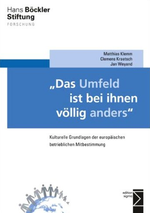  Evaluation of
intercultural co-operation Evaluation of
intercultural co-operation
Over the past few years the University of Erlangen-Nuremberg has scientifically analyzed transnational co-operation between employee representatives during European works council meetings (see report in EWC News 2/2007). The central question here was what basic environment makes co-operation successful. The empirical results from three case studies in the automobile and automobile supplier industries have now been presented in a book published on 30th August 2011. Inside the researchers evaluate, primarily, the intercultural co-operation between employee representatives from Germany and their colleagues from Central and Eastern European countries and show how a common strategy can be developed. The book is available only in German.
On 6th September 2011, ACAS, the national British advisory and conciliation service, released a manual on the use of social networking. Practical examples from the past few months show how the process of social conflict and industrial disputes in the United Kingdom has been radically modified by Internet-based communication channels. The manual highlights the effect of social media on employers, trade unions and employee representatives, as well as the basic legal environment.
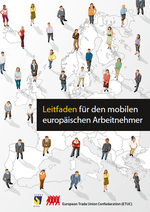  Guide
for cross-border employees Guide
for cross-border employeesThe new edition of a manual, offering assistance for employees who are either temporarily or permanently employed in another EU-member state, was released on 13th September 2011. Which employment legislation is applicable in a specific case? How to deal with pension rights? Which legislation is applicable for social security and right of residence? Where to pay which taxes? All these questions are covered in individual chapters. The manual is available free of charge, in four languages, from the European Trade Union Confederation (ETUC) in Brussels. We have arranged further technical literature on a literature website.
|
|
12. Training and Consultancy
Network "euro-workscouncil.net":
More examples of our
work
|
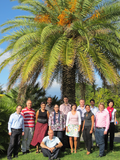  EWC from medical equipment industry drills
consultation procedure EWC from medical equipment industry drills
consultation procedure
The EWC of the US company, Stryker, was reestablished for a new term of office in Rome from 19th to 21st September 2011. Since nearly all representatives from the ten countries had been elected to the EWC for the first time, Dr Werner Altmeyer and Bernhard Stelzl from the training and consultancy network "euro-workscouncil.net" provided a two-day training module. In a business simulation, EWC members were able to familiarize themselves with the practical challenges of restructuring and a consultation procedure on the basis of the new EWC Directive.   Seminar on the
renegotiation of EWC agreements Seminar on the
renegotiation of EWC agreements From 10th to 12th October 2011, employee representatives from Germany and Austria came to the Wartburg Castle in Eisenach, to discuss the contents of their EWC agreements. Prof. Dr Wolfgang Däubler explained the most important aspects of the new legislation. Nine companies from the IT and telecommunications, building services, retail, ophthalmic optics, metal and chemical industries were represented in the seminar.   Pharmaceutical
works councils discuss new legal situation Pharmaceutical
works councils discuss new legal situationFrom 17th to 19th October 2011, 48 works council members from 25 companies in the pharmaceutical industry came to Hamburg. At the meeting, Werner Altmeyer from the training and consultancy network "euro-workscouncil.net" explained the systems of industrial relations in the EU and features of the new EWC Directive. In the pharmaceutical industry, according to many participants, there is a lot of catching-up to be done to bring the practical work in line with the new standards. |
|
13. Current seminar schedule
|
|
The training and consultancy network "euro-workscouncil.net" has been organizing and delivering conferences and training seminars for the members of European works councils, SE works councils and special negotiation bodies since January 2009. So far 269 employee representatives from 130 companies have taken part (representing about 13% of all companies in Europe with an established EWC). The majority of participants came from Germany, France and Belgium, but a further eight countries were represented. Following is an overview of the planned events:
English language courses for works council members 13. – 18.11.2011 in Esher Place (near London)
As every year, a two-day conference will be again held in Hamburg. The topics:
Monday, 23rd January 2012: Beyond information and consultation – developing EWC and SE works council into negotiating partners for central management
EWC seminar on the implementation of consultation procedures  A
EWC seminar will be held, from 10th to 13th April 2012 at Montabaur
Castle, focusing on the new legal situation of information and
consultation in the context of restructuring. How can a European works
council concretely organize the consultation procedure and prepare a
legally water-tight opinion? This seminar is also suitable for SE work
council members.
A
basic seminar will again be held in parallel. It is aimed at newly
elected European works council members and at work council members
wishing to inform themselves on the steps required for the
establishment of a new EWC.
Seminars of the Institute for Further Education of Works Councils (ifb)
Basic seminar: The European Works Council from A to Z 07. – 11.11.2011 in Rottach-Egern 21. – 25.05.2012 in Hamburg 26. – 30.11.2012 in Cologne
Advanced seminar and exchange of experience 04. – 08.06.2012 in Hamburg 03. – 07.12.2012 in Erfurt
In 2011 the training and consultancy network "euro-workscouncil.net" will be organising another SE workshop. Since the number of SE works councils is still relatively small, the next date will be coordinated with any interested participants by telephone. Anybody interested should please fill in and return the following questionnaire.
In-house events Please find a survey of possible subjects for in-house events here: |
|
14. Imprint
|
|
EWC News is published by:
Training and consultancy network "euro-betriebsrat.de" GbR Von-der-Tann-Straße
4, D-20259 Hamburg www.euro-workscouncil.net (English) www.euro-ce.org (French)
Authors collaborating on this issue: Werner Altmeyer, Sandro Maier, Rudolf Reitter, Bernhard Stelzl
Distributor of the German version: 16,258 readers Distributor of the English version: 2,327 readers Distributor of the French version: 2,427 readers
Newsletter archive: www.ewc-news.com
We are always pleased to receive comments and suggestions in relation to this newsletter as well as reports on your EWC activities. Please write us at: info@euro-workscouncil.net
|














 Greater
legal certainty at company level
Greater
legal certainty at company level









 The
non-profit association, Finance Watch, was founded on 30th June 2011 in
Brussels on the initiative of several members of the European
Parliament. Beside consumer protection groups and trade union
federations, its members include the European Trade Union Confederation
(ETUC). The association aims to develop a counterforce to the lobby of
the finance industry.
The
non-profit association, Finance Watch, was founded on 30th June 2011 in
Brussels on the initiative of several members of the European
Parliament. Beside consumer protection groups and trade union
federations, its members include the European Trade Union Confederation
(ETUC). The association aims to develop a counterforce to the lobby of
the finance industry.
